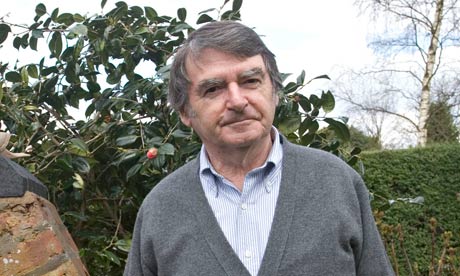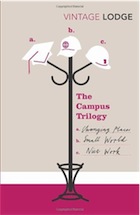Week two: coincidence - John Mullan -guardian.co.uk,

David Lodge. Photograph: Sophia Evans
Finally, about 300 pages into Small World, someone actually says, "It's a small world." The novel's hero, young academic Persse McGarrigle, meets a Japanese academic, Akira Sakazaki, in a Tokyo karaoke bar and finds that the only novelist he personally knows, Ronald Frobisher, is also the only English writer whom Akira translates. No wonder he reaches for the cliché. His Japanese companion confirms that this experience of coincidence is universal by proffering the Japanese idiom – "We say, 'It's a narrow world.'" The title of David Lodge's Small World is a phrase that we use so often because we so often unexpectedly encounter people we know. Every meeting is a coincidence, but in novels coincidence seems to signify some hidden design
 In the stories of the first great English novelist, Daniel Defoe, coincidences are taken as signs of God's providential involvement in human affairs. The point of coincidences is that characters notice them. Robinson Crusoe notices coincidences and sees a pattern of divine purpose. Lodge's characters have other responses. When Persse, on his way to visit his aunt, meets Morris Zapp, who is visiting his former landlord, on the suburban streets of Rummidge, they find they are headed for the same road.
In the stories of the first great English novelist, Daniel Defoe, coincidences are taken as signs of God's providential involvement in human affairs. The point of coincidences is that characters notice them. Robinson Crusoe notices coincidences and sees a pattern of divine purpose. Lodge's characters have other responses. When Persse, on his way to visit his aunt, meets Morris Zapp, who is visiting his former landlord, on the suburban streets of Rummidge, they find they are headed for the same road.
"That's a remarkable coincidence," exclaims Zapp. Of course, they are actually headed for the same house, a discovery that inspires Zapp to do "a little jig of excitement". He is delighted to find that his old drinking partner, Dr O'Shea, is also Persse's uncle; it confirms his convivial confidence that he knows everyone worth knowing. Yet the reader can see, as the characters cannot, that the coincidence is a matter of plotting: it is a way of letting us know the fate of Persse's cousin Bernadette, who lived with the O'Sheas when Zapp was their lodger. Pregnant by an unknown lover, she has disappeared, but will return to play an important part in the story.
Travelling the world looking for the woman he loves, Persse keeps meeting Zapp. "He hadn't been in Amsterdam three hours before he met Morris Zapp." Zapp takes every coincidental encounter as a natural consequence of his own importance. Persse, the ingénu, is always surprised. He also meets Miss Sybil Maiden (note the name), the retired Girtonian expert on fertility rites, almost everywhere. "Fancy seeing you're here." It must be because she is always going to conferences, but no: when they meet on a beach in Hawaii she tells him she is just taking a holiday. She is like a walking narrative principle. "The surprise is mutual," she will say, never sounding in the least surprised. Whenever they meet, she provides some explanation of his misadventures according to the narrative theory of her mentor, Jessie Weston, pioneering analyst of romance stories.
Miss Maiden keeps turning up as a commentator, and because she holds the key to the story of the beautiful identical twins, Angelica and Lily, for whom Persse is searching. Coincidence is a function of the romance plot of the novel, in which the hero quests for, but keeps failing to claim, his beloved, while all the subsidiary characters bump into their former lovers and lost children.
It is almost impossible for the critic to write a "spoiler" for this novel, because the reader knows that anyone who goes missing in one place will reappear in another. Philip Swallow has had a blissful one-night encounter with Joy, who has later been declared dead in a plane crash. But of course he will meet her again on one of those apparently pointless academic jaunts to a distant land. Reunited, the lovers will be enjoying a trip to Jerusalem when they will bump into his son, who just happens to be working on a kibbutz during his gap year.
Full piece at The Guardian.
 In the stories of the first great English novelist, Daniel Defoe, coincidences are taken as signs of God's providential involvement in human affairs. The point of coincidences is that characters notice them. Robinson Crusoe notices coincidences and sees a pattern of divine purpose. Lodge's characters have other responses. When Persse, on his way to visit his aunt, meets Morris Zapp, who is visiting his former landlord, on the suburban streets of Rummidge, they find they are headed for the same road.
In the stories of the first great English novelist, Daniel Defoe, coincidences are taken as signs of God's providential involvement in human affairs. The point of coincidences is that characters notice them. Robinson Crusoe notices coincidences and sees a pattern of divine purpose. Lodge's characters have other responses. When Persse, on his way to visit his aunt, meets Morris Zapp, who is visiting his former landlord, on the suburban streets of Rummidge, they find they are headed for the same road."That's a remarkable coincidence," exclaims Zapp. Of course, they are actually headed for the same house, a discovery that inspires Zapp to do "a little jig of excitement". He is delighted to find that his old drinking partner, Dr O'Shea, is also Persse's uncle; it confirms his convivial confidence that he knows everyone worth knowing. Yet the reader can see, as the characters cannot, that the coincidence is a matter of plotting: it is a way of letting us know the fate of Persse's cousin Bernadette, who lived with the O'Sheas when Zapp was their lodger. Pregnant by an unknown lover, she has disappeared, but will return to play an important part in the story.
Travelling the world looking for the woman he loves, Persse keeps meeting Zapp. "He hadn't been in Amsterdam three hours before he met Morris Zapp." Zapp takes every coincidental encounter as a natural consequence of his own importance. Persse, the ingénu, is always surprised. He also meets Miss Sybil Maiden (note the name), the retired Girtonian expert on fertility rites, almost everywhere. "Fancy seeing you're here." It must be because she is always going to conferences, but no: when they meet on a beach in Hawaii she tells him she is just taking a holiday. She is like a walking narrative principle. "The surprise is mutual," she will say, never sounding in the least surprised. Whenever they meet, she provides some explanation of his misadventures according to the narrative theory of her mentor, Jessie Weston, pioneering analyst of romance stories.
Miss Maiden keeps turning up as a commentator, and because she holds the key to the story of the beautiful identical twins, Angelica and Lily, for whom Persse is searching. Coincidence is a function of the romance plot of the novel, in which the hero quests for, but keeps failing to claim, his beloved, while all the subsidiary characters bump into their former lovers and lost children.
It is almost impossible for the critic to write a "spoiler" for this novel, because the reader knows that anyone who goes missing in one place will reappear in another. Philip Swallow has had a blissful one-night encounter with Joy, who has later been declared dead in a plane crash. But of course he will meet her again on one of those apparently pointless academic jaunts to a distant land. Reunited, the lovers will be enjoying a trip to Jerusalem when they will bump into his son, who just happens to be working on a kibbutz during his gap year.
Full piece at The Guardian.
4 comments:
Excellent to see another Lodge on the bookshelves. I've been quite late to find him, read my first Lodge only in April, 2009. The good thing about that, though, is you get the pleasure to read all an author's output in a short space of time.
He is one of my favourite contemporary UK writers; Some years ago he came to Writers & Readers Week in Wellington and I had the pleasure of looking after him, he was a Penguin author. Also Craig Raine the poet was there that year too.
Greetings from NYC Mark.
Cheers for that. A number of my favourite authors are unfortunately coming to the end of their writing careers, or have done so. Gee, the one I'll really miss, Lodge must be 'getting on', McEwan (same), Roth ... and for me, there doesn't seem to be writers coming through to replace them.
Perhaps there's a sub-set of authors that are of a reader's milieu, that they go through life with, reading, and then the next generation coming through doesn't have the same experiences as them, so there are no replacements? Though my favoured authors, by which I mean those who 'speak to me' on important levels, are all male - that being unsurprising - but are all about twenty years older than me. I have no idea what that latter means, though it no doubt says something about me.
What do a novelist like Lodge (who I would imagine might have a good, dry sense of humour(?)), a poet, and a Bookman talk about over a bottle of wine then? Or do they talk over a beer?
It was so long ago now that sadly I can't recall our conversations. I do remember greatly enjoying Lodge's company though, Raine less so, he was rather aloof. He was published by Faber who in those days Penguin represented in NZ hence my involvement with him.Faber were/are major poetry publishers of course and Raine was one of their young stars back then.
They also published Maurice Gee in the UK. In those days their publisher was the young and dynamic Robert McCrum who these days writes for The Observer. His columns are always worth reading, I often link to them on the blog.
Post a Comment